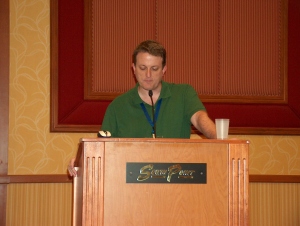Lessons from TAM7: Magic, Deception, and Promoting Skepticism
Posted by mattusmaximus on July 15, 2009
Well, I got back from The Amazing Meeting 7 in Las Vegas a couple of days ago, and now that I’m back to some semblance of normalcy I can get back into a routine. Which includes keeping up to date with this blog. I wanted to take a few minutes to summarize some of what I learned at TAM7 in the two workshops I attended…

1. The first was with magicians Jamy Ian Swiss and D.J. Grothe – their workshop was on the relationship between magic, skepticism, and science. The basic premise of Jamy and D.J.’s workshop was that because scientists are used to dealing with nature (which doesn’t lie) then they are just as easily fooled by charlatans & pseudoscientists as the rest of us. On the other hand, magicians are professional deceivers, so they have an intimate knowledge of how people can be deceived and (perhaps more importantly) how people can deceive themselves.

In the process of their talk, Jamy and D.J. went through a history of magic & deception, touching upon the Reginald Scot, French magician Robert Houdin, founders of the Spiritualist movement (such as the Fox Sisters & Davenport Brothers), Houdini, Joseph Dunninger, Milbourne Christopher, and Uri Geller.
An interesting aspect of how this all tied together was that eventually the Spiritualist movement fizzled because by 1926 with Houdini’s great debunking of various mediums there were too many people claiming that there were physical phenomena proving the afterlife getting busted. This lasted for about 50 years until Uri Geller came on the scene, claiming to be able to bend spoons with his mind, and Geller was able to fool scientists when he was “tested” by the psi-researchers at the Stanford Research Institute (SRI). This has led to a newwoo movement, sometimes dubbed Gellerism, also known as duping people into believing you can bend spoons with your mind.
2. The second workshop I attended was with Tim Farley, creator of the What’s The Harm? website. Tim’s workshop was an introduction to skepticism & critical thinking through understanding various logical fallacies and phenomena that can factor into deceiving our senses. This included an analysis of psychological & physiological phenomena as well as debating tactics used by pseudoscientists.

As a way of applying these skeptical principles, Tim walked us through some specifics regarding alternative “medicine” claims. I think perhaps the most interesting part of this section of the workshop was when he listed the criteria for evaulating the usefulness/trustworthiness of clinical studies (which are often abused by woo-meisters). He summarized is as P.I.C.O.:
Population (P): who was studied? Was it a large group?
Intervention (I): what was done to them?
Comparison (C): to what was this compared? Was there a placebo arm? Were there other controls?
Outcome (O): what was the result? How strong was it?
Bottom Line: Look for large, randomized, double-blind, placebo-controlled, and repeated studies. Some good web-based sources to evaluate medical claims:
The Cochrane Collaboration: voluntary organization that reviews medical studies, give an overall review of effectiveness, findings are very accurate.
Tim finished up his workshop by pointing out a number of tips & tricks that skeptics can use on the Internet to make their voices heard and drive more traffic to skeptically-oriented websites. If you’re interested in some of these tips, check out Tim’s website at http://skeptools.com – if you maintain a website, blog, or post regularly on message boards relevant to skepticism, I highly recommend that you check out Tim’s website.
That’s all for now. There was a lot else that happened at TAM7, but I’ll save that for later posts. Stay tuned 🙂
podblack said
Funny – Novella said Cochrane ISN’T really that good in his summary:
http://lippard.blogspot.com/2009/07/science-based-medicine-conference-part_1401.html
mattusmaximus said
Interesting. I’ll have to check that out, thanks.
Jim Lippard said
There was some diversity of opinion about Cochrane at the Science-Based Medicine conference–Atwood said that it’s not reliable on complementary and alternative medicine, but is good in its reviews of substances. Novella said that it’s good for reporting on studies and results, but he ignores conclusions and pays close attention to authorship.